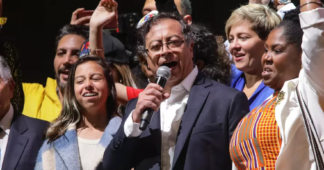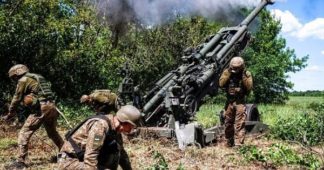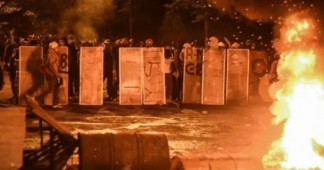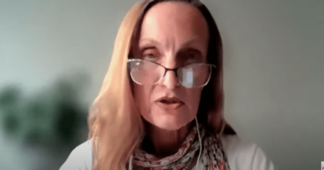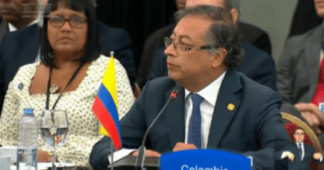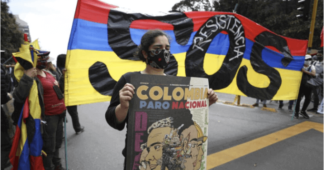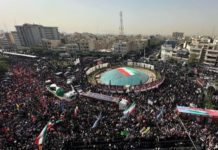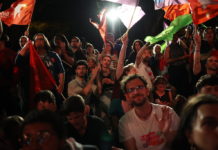Interview with Hernando Calvo Ospina
by Marleen Bosmans / Marc Vandepitte
on July 19, 2023
The election of Gustavo Petro last year as the new president of Colombia filled many with hope. DeWereldMorgen spoke with Hernando Calvo Ospina about peace negotiations, reform plans and Colombia’s positioning in the world.
– DeWereldMorgen: How do you explain that Gustavo Petro, a leftist politician in a country like Colombia, ruled by the right for more than 200 years, was elected president last year?
– Hernando Calvo Ospina: Petro’s electoral victory was not an isolated fact neither of him alone, nor of his political organization, but the result of several processes, the main one being the strong and massive popular demonstrations in several cities of the country, which took place in the three years prior to the elections. This type of protests had not happened in Colombia since 1971, poverty and social marginality is what spontaneously created them. Unfortunately, without political direction.
Colombia is a country of big cities and these mobilizations awakened the majority of Colombians, including part of the middle class. Before, the struggle was only in the countryside led by the guerrillas.
Without those protests in the cities, Petro would never have become president. That is also why it is difficult for some of us to understand why there are still more than 100 young people in jails. Most of them tortured.
DWM: Gustavo Petro is firmly committed to “total peace” in Colombia. What exactly does that imply?
HCO. Let’s look at a little bit of history. Guerrillas in Colombia emerged in the early 1960s with demands for peace, land, education and health. Although armed political confrontations date back to the 1940s. In fact: since Colombia became a republic, the country has not known a single day of peace. Incredible, isn’t it?
Today, the objective conditions that gave rise to this armed movement are more serious: poverty and social marginalization affect 60% of the population. And the political repression against the opposition is worse.
So it cannot be expected that a 70-year burden, in order not to extend it any further, will end with the good intentions of a president. Petro is just trying to scratch a repressive and oligarchic system, which has 200 years structuring everything so that everything remains intact, to his liking and benefit.
But despite this, the social, political and economic conditions and repression for the majority of the population are so serious that the scratches Petro has made can be considered immense.
That is why I believe that the “total peace” offered by Petro is a beautiful dream. Of which one cannot lose hope of living it someday.
Unless one limits “total peace” to an agreement with the guerrillas, to the silence of those weapons. But that kind of ‘silence’ would still not be peace as long as there is no peace with social progress. This has already been proven with the demobilizations of several guerrilla organizations, including the same one where President Petro was a militant, the M-19: nothing changed, everything kept getting worse. And not to mention the social and economic progress made with the surrender of a good part of the FARC.
DWM: How do you assess the possibilities of the peace project becoming a reality in the not too distant future?
HCO: The foundations of the Colombian state are not going to let President Petro touch them, and even if they let him, he will not even have time.
And here it is good to remember that a president does not come to power but to government. And that a president is like the manager of a company, without being the major shareholder.
That yes, almost repeating: that an important part of Colombians have taken him to the presidency, has produced a shake-up in this stagnant, starving and murderous system.
And that “total peace”, having a narco-paramilitary oligarchy and defended by military forces educated since the sixties under the National Security Doctrine, that is, ideologically prepared to repress the internal enemy, that is, the people… is not easy at all. That mental plague cannot be removed with laws of a Congress and even less with orders from a president. Not even by dismissing the entire command: That Doctrine and the marriage with the narcoparamilitaries are part of the genes of the State and its Armed Forces.
For peace to really happen, it is necessary to start today, right now, and by something impossible in Colombia: that the United States stops training and directing the Colombian Armed Forces.
Not to say that Washington, through the U.S. Embassy and the Southern Command, would have to stop directing Colombian strategic affairs. Well, even if Petro is the president, which is the reality today. And it will be tomorrow and the day after…
No other state in Latin America has been as repressive and bloodthirsty as the Colombian. Pinochet and the Argentinean dictators were apprentices next to this “democracy”.
But Petro will be able to make some marks. And that will bring immediate benefit to a sector of the population. And although this will not remove the structures of this State, it will be useful in the current state of misery and violence in which this country, so immensely rich in strategic resources, has been living.
DWM: In February of this year, Gustavo Petro launched his “Plan Colombia, world power of life”. In your opinion, what are the strong points of this plan compared to the development programs of previous governments?
HCO: They are good intentions that should be supported, even if one knows that to develop the “Plan” one has to go over the heads of that murderous and hungry oligarchy-State. And as I have already said that they are not going to let them.
Of course, if for once that oligarchy understands that the minimum changes proposed by Petro could change the terrible image of the country in the international arena and that it would be useful for their business, they could make some progress.
And the fact is that Petro only proposes to modernize that stagnant state apparatus, whose economy barely works because it is very much directed to the accumulation of uncultivated lands. And in this, a good part of the Colombian oligarchy, particularly the ones that were born with drug trafficking, still have the mentality left by colonial Spain: power is in owning land, cows and horses, without worrying about technology. They do not learn, this is why Spain and Portugal lagged behind most European nations, despite having stolen so much from their colonies. While England, Holland, Germany and France, mainly, took advantage of the money that their banks took from Spain and Portugal to advance the “industrial revolution”.
Then, if that latifundist naco-oligarchy understood that Petro wants to modernize that state apparatus, to make it more competitive at the world level and increase the distribution of social and economic profits for the majorities, Colombia could begin to be a “world power of life”.
In Colombia it is not guns that kill the most: it is hunger.
Oh, and Petro has never mentioned that he wants to touch the structural bases of that State. He is a Spanish-type liberal. And yet, for the terrible Colombian situation he has almost become a communist with the little spiders that this narco-State has allowed him to make so far.
What about the development plans of the previous governments, you ask me about those that served to rob the State and distribute it among the gringos, friends and lovers, or about the plans to increase repression?
DWM: Since taking office as president, Gustavo Petro took initiatives to break Venezuela’s international isolation. It is known that this isolation is part of the US strategy to appropriate its oil, and is supported by the EU. How do you evaluate Petro’s position in this regard?
HCO: First of all, we must make this clear: the US imposed on the Colombian government the negotiations with the FARC, with the sole purpose of disarming them. And they conducted those negotiations from behind the scenes. But this had nothing to do with peace in Colombia, because as I have already said, peace is not achieved in Colombia just by silencing guns.
The US had two very important interests in that negotiation: ONE, if it carried out an invasion of Venezuela from Colombia, the FARC would not be a problem on that border. For it was logical, and this was what their commanders had expressed, that the FARC would fight the invading troops of the brother nation, be they gringo, NATO or Colombian.
TWO, that their companies would manage to enter the territories controlled by the FARC, since up to that moment only companies from other countries, mainly Chinese, could do so. And here I must clarify that neither the Chinese, nor the Russians, nor the Iranians have sent troops or advisors to help repress and assassinate the Colombians: historically it is the Americans that have done that. That is why their companies have been part of the military objectives of the guerrillas.
Colombia, with the previous governments, was serving as a beachhead to invade Venezuela. It was not long before this was achieved. The civil-military unity in Venezuela contained them. But the United States has not changed its interest in destabilizing the Bolivarian government in order to seize the immense wealth it possesses, which almost no other country in the world has. Not even Colombia.
What Petro has achieved is to stop Washington’s momentum of aggression. Petro and a part of the Colombian oligarchy know that an invasion of Venezuela would be a conventional war that would be returned to their own territory. And the Colombian troops are, unfortunately, excellent in irregular warfare, guerrilla combat and repression of the people, as very few in the world, but limited even in armament to fight an external enemy.
In addition, Colombia was losing billions of dollars in trade due to this aggression against Venezuela, since even the border was closed. Petro has been pragmatic in this.
And let’s not forget that more than 3 million Colombians live in Venezuela, not counting the children and grandchildren of those Colombians who were born there, because that migration has been going on since the 50’s of the last century, mainly due to state violence and poverty in Colombia. A reality that almost nobody knows. Or does not want to know.
If the U.S. has not pressured, so far, Petro to resume the aggression against Venezuela, nor for paramilitary actions from Colombia, it is because it has its reasons. Or because it has verified that an invasion to the land of Bolivar could be very expensive for it because of the reactions in the continent and so close to its borders.
But when Washington wants it, it demands it from Petro. And he does it or he will be overthrown. Or they kill him, which is the simplest thing to do in Colombia.
Hernando Calvo Ospina is a writer, filmmaker and a member of the Network in Defense of Humanity. He is a former Colombia political prisoner living in France
Source: Cuba en Resumen
We remind our readers that publication of articles on our site does not mean that we agree with what is written. Our policy is to publish anything which we consider of interest, so as to assist our readers in forming their opinions. Sometimes we even publish articles with which we totally disagree, since we believe it is important for our readers to be informed on as wide a spectrum of views as possible.
